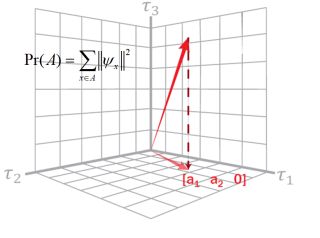COGNITION- Is Your Brain (Like) a Quantum Computer? There's some evidence that the brain may use quantum mechanics in some way. Reviewed by Ray Parker

KEY POINTS-
- Quantum mechanics can be used to describe the behavior of any system and how it responds to measurements.
- One controversial view is that quantum superpositions are represented in microtubules in the brain.
- Quantum probability can describe many interesting behavioral phenomena in psychology and decision-making.

One of the beautiful things about physics, as a field, is its ability to inspire the creation or use of new mathematical tools to describe the phenomena they study. Among the most interesting instances of this is the development of quantum mechanics, which is used to describe how measurement affects the behavior of physical systems.
For example, measuring the location of an electron “collapses” the uncertainty about its position, but introduces uncertainty about its momentum. The mathematics of quantum probability work very well for describing and predicting how these tiny particles will behave as we interact with them.
The Brain as a Quantum System
Our brain is certainly composed of subatomic particles. But does that make our brain a quantum system? It is difficult to imagine that the brain is a quantum computer, though work by Hameroff and Penrose on “quantum consciousness,” has suggested that microtubules in neurons of the brain might temporarily maintain superposition states and exhibit quantum properties.
This work has even suggested that measurements of the superposition states in the brain give rise to our conscious experience of the world. This view is quite controversial and will take quite a bit more work to fully investigate. I would rather ask a simpler question: Can your brain be described well as if it were a quantum system? And why would we even consider doing so?
Fundamentally, quantum probability—the statistical theory that underlies quantum mechanics—is concerned with representing uncertainty (superposition) and how it interacts with measurement. While the behavior of subatomic particles is certainly the most apparent application, there is nothing limiting it to being concerned with only physical measurement. Theoretically, it can be applied to describe any system where measurements interfere with the state of the system being measured.
Behavior and Quantum Systems
This is where approaches like quantum cognition have taken root. Quantum cognition, in contrast to quantum consciousness, mentioned earlier, makes no assumptions about the brain actually representing quantum states. Rather, it seeks to use the mathematical language of quantum probability to describe the way people make decisions. As it turns out, the ways people think and behave share a few properties with quantum(-like) systems:
- Making a decision or answering a prompt can change our beliefs or preferences, taking them from a state of uncertainty to one of certainty. For example, if I am asked how I felt about a movie right after seeing it, I might have mixed feelings until I commit to the stance that “it was good.” Being forced to make one of a set of responses reduces the uncertainty I have about my own thoughts.
- Making one choice (measurement) often affects later choices and judgments (measurements). Order effects are quite well-established in psychology, such that asking question A and then question B can yield very different responses than asking question B and then question A. For example, asking someone how happy they are with their life, and then asking how many dates they have been on, often results in a fairly weak relationship between the two outcomes; however, asking it in the opposing order (how many dates have you been on, then how happy are you) causes people to respond with much greater (or less) happiness when they have (not) been on many dates.
- Measuring someone’s attitudes or beliefs by having them make a decision about one topic can make them uncertain about another topic. Asking someone how their partner or friend might like a movie can make them uncertain about whether they would like it, and asking how they might like the movie can make them uncertain whether their partner or friend would like it. It is difficult for us to understand multiple perspectives at the same time, because they may be ”incompatible.”
- People’s behavior under uncertainty differs from their behavior under certainty. In a classic two-player game called the Prisoner’s Dilemma, participants are likely to act in a cooperative way with the other player when they do not know what the other player will do. However, when they are informed what the other player plans to do, regardless of what exactly they are told the other player will do, they tend to become less cooperative. The possibilities for what the other player will do are identical in both scenarios, but somehow the knowledge about the other’s intentions results in very different behavior in the game.
The question is not so much whether quantum probability can be applied to describing decision-making, but whether it is better than so-called “classical” probability. The phenomena described above are largely inconsistent with a classical view, where people have particular beliefs and preferences that remain unchanged when they answer questions and prompts.
The classical probability approach would not predict that people change their behavior under uncertainty, that making choices would make them more certain, would allow them to entertain multiple perspectives at once, and would not predict any order effects. As a result, it’s not very good for predicting how people are going to behave when they make decisions.
A key to all of this is to understand why behavior and the brain might exhibit these quantum properties. Some of my past work actually went into demonstrating that there doesn’t need to be anything quantum about the brain for it to exhibit behavior that follows quantum probability. We showed that a classical neural network can represent things that look like superposition states, measurement collapses, interference, and order effects.
In other words, your brain can behave like a quantum system without having any inherent (physically) quantum parts.
Does Quantum Probability Assist in Describing Behavior?
The question, then, is whether quantum probability will help us understand our brains and behaviors. On the surface, quantum probability appears to describe many of the puzzling phenomena in psychology and decision sciences.
With this observation, it becomes more understandable that quantum probability might be a good option for describing behavior; it allows us as researchers to better understand and predict what goes on in the mind when deciding. It allows us to understand the context in which decisions unfold by “default”—rather than having to build special rules for every violation of classical probability.
While your brain might not be a quantum computer, it might be worthwhile to describe its behavior using quantum mechanics. In short, quantum is not just for physicists.
- Questions and Answers
- Opinion
- Story/Motivational/Inspiring
- Technology
- Art
- Causes
- Crafts
- Dance
- Drinks
- Film/Movie
- Fitness
- Food
- الألعاب
- Gardening
- Health
- الرئيسية
- Literature
- Music
- Networking
- أخرى
- Party
- Religion
- Shopping
- Sports
- Theater
- Wellness
- News
- Culture
- War machines and policy

